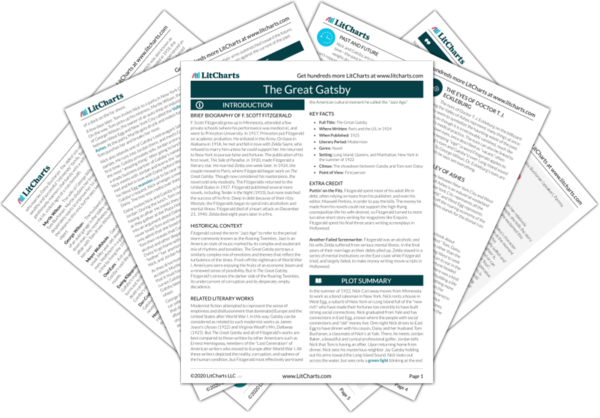F. Scott Fitzgerald coined the term "Jazz Age" to describe the decade of decadence and prosperity that America enjoyed in the 1920s, which was also known as the Roaring Twenties. After World War I ended in 1918, the United States and much of the rest of the world experienced an enormous economic expansion. The surging economy turned the 1920s into a time of easy money, hard drinking (despite the Prohibition amendment to the Constitution), and lavish parties. Though the 1920s were a time of great optimism, Fitzgerald portrays the much bleaker side of the revelry by focusing on its indulgence, hypocrisy, shallow recklessness, and its perilous—even fatal—consequences.
The Roaring Twenties ThemeTracker

The Roaring Twenties Quotes in The Great Gatsby

Unlock explanations and citation info for this and every other The Great Gatsby quote.
Plus so much more...
Get LitCharts A+“[…] They’re real.”
“The books?”
He nodded.
“Absolutely real—have pages and everything. I thought they’d be a nice durable cardboard. Matter of fact, they’re absolutely real. Pages and—Here! Lemme show you.”
[…]
“See!” he cried triumphantly. “It’s a bona fide piece of printed matter. It fooled me. This fella’s a regular Belasco. It’s a triumph. What thoroughness! What realism!”
“Fixed the World’s Series?” I repeated.
The idea staggered me. I remembered of course that the World’s Series had been fixed in 1919 but if I had thought of it at all I would have thought of it as a thing that merely HAPPENED, the end of some inevitable chain. It never occurred to me that one man could start to play with the faith of fifty million people—with the single-mindedness of a burglar blowing a safe.
“How did he happen to do that?” I asked after a minute.
“He just saw the opportunity.”
“Why isn’t he in jail?”
“They can’t get him, old sport. He’s a smart man.”
“Do you like it?”
“I love it, but I don’t see how you live there all alone.”
“I keep it always full of interesting people, night and day. People who do interesting things. Celebrated people.”
I've always been glad I said that. It was the only compliment I ever gave him, because I disapproved of him from beginning to end. First he nodded politely, and then his face broke into that radiant and understanding smile, as if we'd been in ecstatic cahoots on that fact all the time.
“Start him! I made him.”
“Oh.”
“I raised him up out of nothing, right out of the gutter. I saw right away he was a fine appearing, gentlemanly young man, and when he told me he was an Oggsford I knew I could use him good. I got him to join up in the American Legion and he used to stand high there. Right off he did some work for a client of mine up to Albany. We were so thick like that in everything—” He held up two bulbous fingers “—always together.”











